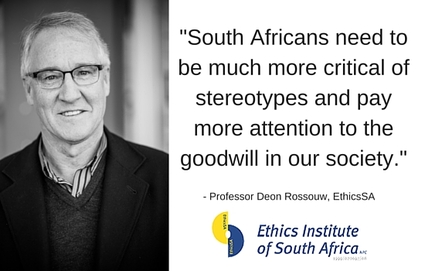 The current social media storm on racism demonstrates yet again how dangerous stereotypes are, and how easily they can become self-fulfilling prophecies. To prevent these inaccurate but powerful stories from setting the national agenda, South Africans must consciously tell a different story - backed up by the facts. “The reaction to recent racist tweets has shown the power of stereotypes to influence the way a whole nation sees itself, spreading negativity that affects not only individuals but the national mood itself. These tweets seem to confirm stereotypes so they spread easily, but they are simply not borne out by the facts,” says Professor Deon Rossouw, CEO of the Ethics Institute of South Africa (EthicsSA). “We need to be much more critical of these stereotypes and pay more attention to the goodwill in our society.” As an example of a stereotype related to corruption in South Africa, Professor Rossouw cites the findings in the recent survey into bribery conducted by EthicsSA and sponsored by Massmart. The survey found that while 78 percent of South Africans believe that bribery is necessary to get through everyday life, only 20 percent know somebody who has actually paid a bribe. In other words, even though the “received wisdom” is that bribery is both common and necessary, the vast majority of South Africans act differently. “Despite that finding, it was interesting that most of the headlines reporting on the survey incorrectly focused on the stereotype—‘Most South Africans pay bribes’—while the reality is that most do not,” says Professor Rossouw. “We need to discard inaccurate stereotypes consciously, or we risk feeding them and letting them become true.” Another example of how stereotyping masks, and can overpower, reality is evident in the racism debate currently underway, he continues. The spate of racist tweets and reactions to them can seem to confirm stereotypes that everybody is racist, thus creating the impression that reconciliation and nation-building have failed and are no longer worth pursuing. In fact, the opposite is true as the SA Reconciliation Barometer 2015 shows. Published late last year by The Institute for Justice and Reconciliation, the survey provides factual evidence that the vast majority of South Africans are committed to reconciliation and nation-building: 75.5 percent favour an inclusive South African identity, and 71 percent believe it is important to have a united South African nation. “This is astonishing given the fact that a majority (61.4 percent) also believe that race relations have stayed the same or worsened since democracy. So yes, the challenges remain daunting and not enough progress is being made, but the reality is that most of us want the South African project to succeed. You would never guess that from the dominant narrative in social (and other) media, though it’s apparent in work places and other places where people mingle,” Professor Rossouw argues. “We must tap into this reality, and use them to create a positive frame for the important national conversations that must take place. If we do not, we risk letting the stereotypes—the dangerous and inaccurate myths—dominate our reality. We must not let that happen.” ENDS MEDIA CONTACT: Cathlen Fourie, 082 222 9198, [email protected], www.atthatpoint.co.za For more information on EthicsSA please visit: Website: www.ethicssa.org LinkedIn: Ethics Institute of South Africa Facebook: Ethics Institute of South Africa
0 Comments
Leave a Reply. |
Welcome to the newsroom of The Ethics Institute. For media releases prior to August 2014 please click here.
Archives
August 2017
Categories
All
|

 RSS Feed
RSS Feed